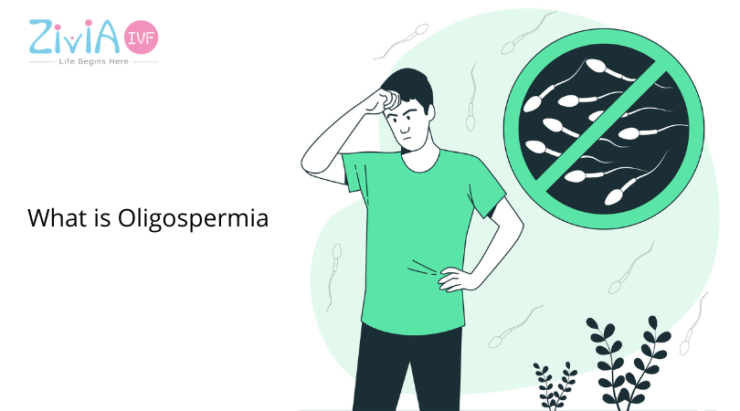
What Is Oligospermia? Low Sperm Count Symptoms, Causes, and Treatment
What Is Oligospermia ?
Oligospermia is a type of male infertility condition found in men with low sperm count in their semen. A healthy amount of sperm in a man is usually required for successful conception of pregnancy. As per by WHO, oligospermia is defined as sperm count is less than 15 million sperm per ml.
Oligospermia can be classified into three categories:
- Mild oligospermia sperm count = 10 to 15 million sperm/mL.
- Moderate oligospermia sperm count = 5 to 10 million sperm/mL.
- Severe oligospermia sperm count = 0 and 5 million sperm/mL.
Causes of Oligospermia or low sperm count include:
Hypothalamus and pituitary gland Hormonal imbalances: The sperm production gets impaired if any alteration occurs in these hormones produced by hypothalamus and pituitary glands.
Ejaculation problems: In some patients semen reverses back to the bladder instead of flowing out of the penis. This condition reduces the sperm count and causes infertility in men.
Undescended testicles: Men born with this condition are more likely to be infertile. If during fetal development, the testicles do not descend from the abdomen into the testicular sac / scrotum, then the fertility of that person gets impacted.
Anti-sperm antibodies: Sometimes immune system cells (anti-sperm antibodies) tend to kill the sperms by mistakenly identifying them as harmful pathogens. This causes low sperm count.
Chromosomal abnormalities: Certain genetic conditions can cause abnormal development in the male reproductive organs.
Obstructions: Obstruction is one of the common causes of oligospermia. The reproductive system tubes that carry sperm, if blocked by some conditions like cystic fibrosis or any injury due to prior surgeries and infections, can lead to a low flow of semen.
Trauma or injury: Certain surgical procedures like prostate surgeries, vasectomy, hernia repair surgery, scrotal surgeries etc. cause reduction in the sperm count in your seme ejaculate.
medications: Certain medicines like testosterone replacement therapy, antibiotics, antifungal, ulcer medicines, chemotherapy drugs, etc. can interfere sperm production.
Environmental factors: Exposure to chemicals, radiation, and heavy metals may hamper sperm production.
Symptoms of Oligospermia
In some men, there are no obvious signs and symptoms of low sperm count seen. Only when they find difficulty in conceiving a child and couple starts diagnostics tests or doctor consultation, then this medical condition gets diagnosed. But if a man has low sperm count due to other associated conditions like chromosomal abnormalities, hormonal imbalance or any obstruction, then certain signs and symptoms may occur.
- Swelling, pain, or lump in testis.
- Sexual function issues like the erectile dysfunction i.e inability to maintain an erection during sexual intercourse.
- hormonal imbalances, low facial and body hair growth, body growth abnormality
- Thick discharge.
- Enlarged and swollen veins in the scrotum.
- If this problem happens due to transmission of a viral infection, then that man can experience some burning sensation while urinating.
When to See a Doctor
If you find any of the above-given symptoms, then seeking help from a fertility expert as soon as possible is the best option for you. The fertility expert would further investigate and diagnose the condition and will provide guidance on further treatment accordingly.
Risk Factors
There are some risk factors associated with low sperm count.
- Unhealthy habits like smoking, alcohol consumption, and drug addiction
- Being overweight
- Depression or stress in work (job or business) and family life
- Being affected by certain infections in past
- Exposure to toxins and chemicals
- Testicles being exposed to extreme heat
- Trauma or injury to the testicles
- Use of certain medications
- Undescended testicles
- Patients undergoing treatments like radiation and chemotherapy for chronic illness or tumors
- Genetic and chromosomal abnormalities
Low sperm count is caused by various genetic, medical, lifestyle and environmental factors. Certain aspects can not be avoided, however there are other such known factors that can be prevented to protect one’s fertility.
Living a healthy lifestyle, keeping stress away and avoiding chemical exposure are some basic and simple but effective measures to have healthy sperm production. If a person is affected by low sperm count due to any hormonal, genetic and medical condition, then a proper treatment from fertility experts and other medical or surgical experts can improve their production in some cases.
Diagnosis of Oligospermia
Following tests are recommended for diagnosis of the condition:
- Semen analysis
- Scrotal ultrasound
- Hormone testing
- Post-ejaculation urine analysis
- Genetic tests
- Testicular biopsy
- Anti-sperm antibody tests
- Specialized sperm function tests
- Transrectal ultrasound
Treatment of Oligospermia
There are multiple ways to manage this medical condition. Fertility experts will be able to guide you which among the following options is suitable for you.
- Medical treatment
- Surgical treatment
- hormone treatments
Following a healthy lifestyle like regular exercises and avoiding smoking and alcohol can improve the sperm count to some extent.
Consulting to a fertility expert is your best option. The fertility expert doctor would help you with assisted reproductive treatments.
At Zivia IVF we provide complete solutions and guidance for infertility related issues. Kindly contact our team to get a personalized treatment plan for you.
